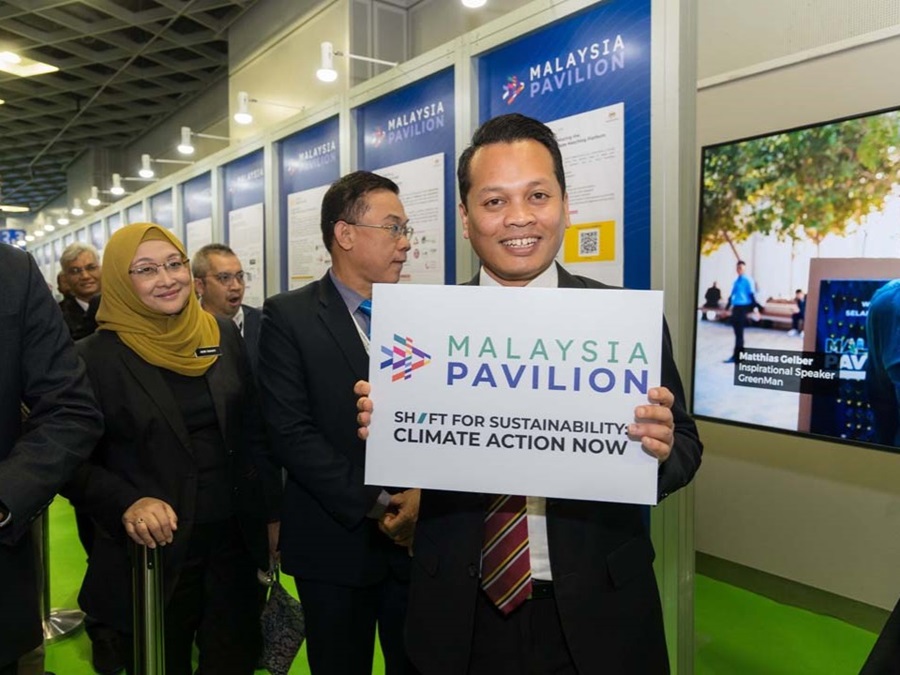Malaysia is preparing to make a substantial impact at the upcoming COP29, scheduled to take place in Baku, Azerbaijan from 11 to 22 November 2024. With a delegation exceeding 250 representatives from government agencies, private businesses, NGOs, youth groups, and policymakers, Malaysia is set to advocate its “whole-of-nation” commitment to climate action through its Malaysia Pavilion, themed “Shift for Sustainability – Climate Action Now!”
This year’s Malaysia Pavilion highlights seven priority areas essential to achieving net-zero emissions and promoting regional sustainability, aligning with COP29’s theme, “Enhance Ambition, Enable Action.” Malaysia’s participation not only underlines its dedication to addressing climate challenges but also leverages its incoming ASEAN chairmanship to spotlight regional voices and cooperation on global platforms.

The Malaysian delegation, led by Minister of Natural Resources and Environmental Sustainability, Nik Nazmi Nik Ahmad, emphasised the nation’s resolve to drive transformative change. “We are eager to unite with the global community, pushing the boundaries to achieve bold sustainability goals and build a resilient climate future for all,” said the Minister in a statement issued to the media.
The Malaysia Pavilion’s seven key focus areas include:
- Finance and Economy: By advancing its sustainable finance framework, Malaysia aims to strengthen climate financing and carbon markets, attract ASEAN investments, and position itself as a leader in green finance with a focus on international partnerships for net-zero pathways.
- Trade and Industry: Integrating circular economy principles and sustainable trade practices, Malaysia sets clear guidelines for sustainable supply chains, carbon trading, and climate governance to foster impactful regional collaborations.
- Natural Resources: As one of the world’s 17 megadiverse countries, Malaysia emphasises community-based stewardship and biodiversity preservation, underscoring the importance of ecological sustainability in collaboration with global partners.
- Energy: Through initiatives like the National Energy Transition Roadmap (NETR), Malaysia promotes green energy solutions, including carbon capture, hybrid solar projects, and regional grid connections, positioning the country as a hub for sustainable energy investment.
- Tech and Innovation: Malaysia’s climate strategy includes merging advanced technology with indigenous knowledge to bolster climate resilience. The country aims to become a leader in scalable climate tech solutions.
- Sustainable Development: Malaysia’s adaptive urban planning strategy aims to create resilient, climate-friendly communities that prioritize social equity, seeking regional support to build sustainable urban infrastructure.
- Youth and Adaptation: Malaysia emphasises the empowerment of youth, women, and indigenous communities to address climate adaptation challenges, including food security and flood resilience, ensuring inclusive representation in climate discussions.
Since 2010, Malaysia’s green economy initiatives have drawn over RM10 billion in investments and generated 5,579 green jobs through the Green Technology Financial Scheme (GTFS). Malaysia’s COP29 participation will also highlight its commitment to the green economy as outlined in Budget 2025, which includes introducing a carbon tax by 2026. This policy shift aims to accelerate the adoption of sustainable technologies and strengthen Malaysia’s leadership in the green economy.
The Ministry of Natural Resources and Environmental Sustainability, supported by the Malaysian Green Technology and Climate Change Corporation (MGTC), will lead Malaysia’s efforts at COP29. Key sponsors include Tenaga Nasional Berhad, Petroliam Nasional Berhad (Petronas), the Malaysian Palm Oil Council (MPOC), Malayan Banking Berhad (Maybank), Bank Pembangunan Malaysia Berhad, Kloth Cares, and De Carton, underscoring a unified national commitment to the global climate agenda. ![]()
